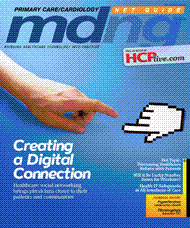Publication
Article
MDNG Primary Care
Social Media Notebook: Do You Have a License to Drive that Facebook Account?
Author(s):
Parents listen to our every word of "anticipatory guidance" when kids are small, but when it comes to tween and teen issues online, parents somehow start mistakenly thinking they don't need us as much.
“He’s 11 but very mature, so this year, we let him onto Facebook,” a dad told me recently.
I asked one simple question: “How did you deal with Facebook’s minimum age of 13?”
“We used our e-mail and changed his birthday,” noted the dad. “We’re always around when he goes on. That’s the rule. So, he’s safe, and it’s all ok.”
This is no anecdote or journalistic manipulation of the facts. This is not only a true story, but it is becoming a common occurrence in families with “tweens,” despite the fact that in order for members of this age group to get a Facebook account they must do things that we tell our kids never to do online: lie about their age and lie about who they really are.
Parents listen to our every word of “anticipatory guidance” when kids are small, but when it comes to tween and teen issues online, parents somehow start mistakenly thinking they don’t need us as much. With visits becoming less frequent and time in the office shortened, physicians have to work even harder to get their points across and help parents understand that we are still experts in their children’s worlds. But, how can we accomplish it all in one visit? It’s simple. Use one analogy for both worlds: driving.
I ask teens and parents if they’d ever drive without a license. They, of course, say “no.” I then casually inform them that social media sites all have age guidelines in place that are really considered online “graduated” laws and that it’s our job as parents to enforce those laws. Just as we wouldn’t allow our teen to drive a car without proper information and experience, we shouldn’t allow a child on Facebook or similar sites before the stated age and without proper experience on sites meant for their own age group.
I address maturity issues up front. Tweens are wired to follow directions, but that changes in teen life as the brain becomes rewired to get ready for adult life. I explain that the reasoning frontal cortex doesn’t kick in until late in teen life, and before then it’s all refl ex, driven by a section of the brain called the amygdala. I then refer them to the PBS website, which has a wonderful explanation. I explain that the formerly rule-following tween will become a risk-taking teen.
I also explain that socially, tweens are not ready to hang with teens. I ask parents if they’d ever let their 11-year-old go to a party with 18-21-year-olds. The “no” answer helps them understand that being on Facebook is the online equivalent of just such a party.
Finally, I gently point out that using a parent’s e-mail to sign up for any site and changing the dates of a birthday gives the impression that it’s acceptable to engage in this type of behavior… even after we spend a lot of time telling kids never to lie about that sort of stuff. By this point, parents start to see the light.
You can accomplish all of this in a matter of minutes by chatting casually during the physical examination or while entering data in your EHR. The more ways you find to raise these issues face-to-face, the more your families will begin to recognize how important they are and that the online world’s rules are as important to follow as the offl ine world’s laws.
Being a savvy Health 2.0 physician also means not stopping at face-to-face chats! Use your online venues to reinforce these messages. Blog about age issues associated with online use. Create a list of sites that you hear your patients are using, and remind people of the ages of use for those sites. You can even create a handout that you can give to families in the office or post on your office website. Being a physician in 2009 means being as online as our patients and understanding what that means. Our families want that from us, and all of us are capable of providing that level of outstanding care.
Gwenn Schurgin O’Keeffe, MD, FAAP, (aka “Dr. Gwenn”) is a pediatrician, health journalist, parenting and social media expert, and is CEO and Editor-In-Chief of Pediatrics Now, an online health and communications company dedicated to providing reliable information for today’s busy families. She also writes the blog Dr. Gwenn Is In.






